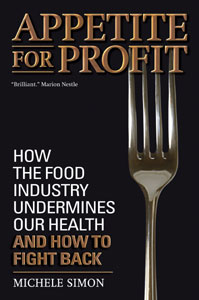 In December 2006, I interviewed author Michele Simon about her book, "Appetite for Profit: How the Food Industry Undermines our Health and How to Fight Back." The excerpts below are from that original interview, which took place on WORT, community radio in Madison, Wisconsin. For more information on Michele and her work, please visit her website.
In December 2006, I interviewed author Michele Simon about her book, "Appetite for Profit: How the Food Industry Undermines our Health and How to Fight Back." The excerpts below are from that original interview, which took place on WORT, community radio in Madison, Wisconsin. For more information on Michele and her work, please visit her website.
Judith Siers-Poisson (JSP): How did you personally become so involved and interested in food politics?
Michele Simon (MS): It started about 10 years ago when I was struggling with my own weight and turned to a vegetarian diet and, lo and behold, I lost the weight I was struggling with. And then, from there, I started to learn all of the other ways our diet impacts our own health, in addition to the environment, animal welfare, and labor, and so many aspects of society -- I was just amazed at how much was impacted by those food choices.

 In December 2006, I interviewed author Michele Simon about her book, "Appetite for Profit: How the Food Industry Undermines our Health and How to Fight Back." The excerpts below are from that original interview, which took place on
In December 2006, I interviewed author Michele Simon about her book, "Appetite for Profit: How the Food Industry Undermines our Health and How to Fight Back." The excerpts below are from that original interview, which took place on